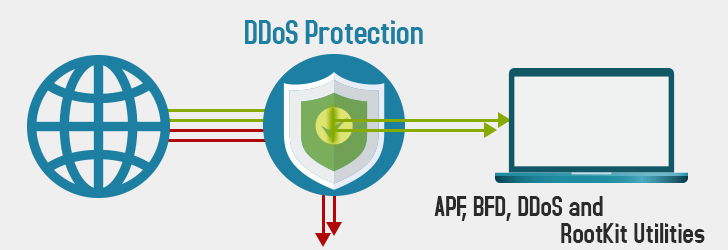
Being a web host, your servers are constantly being attacked by hackers by denial-of-service (DoS) and other brute force attacks. There is no foolproof method to stop 100% of all attacks, but there are ways to protect your servers by applying firewall rules, and detecting and banning attacking IPs.
This article makes use of the APF, BFD, DDoS Deflate and RootKit to detect and protect your server from denial-of-service type attacks. To apply those utilities, please follow the instructions below:
To begin installation, login to your server as a root user.
% ssh -l root [hostname] root@[hostname]'s password: [password] Last login: [Date] from [hostname]
APF -- Advanced Policy-based Firewall
Get the latest source from the rfxnetworks, and install the software.
# cd /usr/src # mkdir utils # cd utils # wget http://rfxnetworks.com/downloads/apf-current.tar.gz # tar xfz apf-current.tar.gz # cd apf-* # ./install.sh
Read the README.apf and README.antidos for configuration options. Edit the /etc/apf/conf.apf and modify the following lines to your need.
DEVEL_MODE="0" IG_TCP_CPORTS="21,22,25,53,80,110,143,443,3306" IG_UDP_CPORTS="53,111" USE_AD="1"
By default, APF is setup to run in development mode which flushes firewall rules every 5 minutes. Running in development mode defeats the purpose of running APF, as it will automatically flush every 5 minutes. Configure the Ingress (inbound) TCP and UDP ports that need to be opened. Finally, enable AntiDos by setting USE_AD="1".
Edit the /etc/apf/ad/conf.antidos as you fit necessary, and start the APF firewall.
# apf --start
BFD -- Brute Force Detection
BFD is a shell script which parses security logs and detects authentication failures. It is a brute force implementation without much complexity, and it works in conjunction with a APF (Advanced Policy-based Firewall).
## Get the latest source and untar. # cd /usr/src/utils # wget http://rfxnetworks.com/downloads/bfd-current.tar.gz # tar xfz bfd-current.tar.gz # cd bfd-* # ./install.sh
Read the README file, and edit the configuration file located in /usr/local/bfd/conf.bfd.
Find ALERT="0" and replace it with ALERT="1"
Find EMAIL_USR="root" and replace it with EMAIL_USR="username@yourdomain.com"
Edit /usr/local/bfd/ignore.hosts file, and add your own trusted IPs. BFD uses APF and hence it orverrides allow_hosts.rules, so it is important that you add trusted IP addresses to prevent yourself from being locked out.
## Start the program. # /usr/local/sbin/bfd -s
DDoS Deflate
## Get the latest source # cd /usr/src/utils # mkdir ddos # cd ddos # wget http://www.inetbase.com/scripts/ddos/install.sh # sh install.sh
Edit the configuration file, /usr/local/ddos/ddos.conf, and start the ddos.
# /usr/local/ddos/ddos.sh -c
RootKit -- Spyware and Junkware detection and removal tool
Go to Rootkit Hunter homepage, and download the latest release.
## Get the latest source and untar # cd /usr/src/utils # wget http://downloads.rootkit.nl/rkhunter-<version>.tar.gz # tar xfz rkhunter-*.gz # cd rkhunter # ./installer.sh ## run rkhunter # rkhunter -c
Setup automatic protection on System Reboot
## Edit /etc/rc.d/rc.local ## (or similar file depending on Linux version) ## Add the following lines at the bottom of the file /usr/local/sbin/apf --start /usr/local/ddos/ddos.sh -c
Note:
The SYN Floods and ICMP DDoS may also be prevented by utilizing the Linux traffic control utility (tc). To view setup instructions, please see relevant sections of Linux Advanced Routing & Traffic Control HOWTO.
Notes from the users:
Some of the users experienced following errors while starting APF.
bash# apf --startAccording to Burst and Ryan of r-fx.org, changing the SET_MONOKERN variable in /etc/apf/conf.apf to "1" will correct the problem.
Unable to load iptables module (ip_tables), aborting.
Share this post
Leave a comment
All comments are moderated. Spammy and bot submitted comments are deleted. Please submit the comments that are helpful to others, and we'll approve your comments. A comment that includes outbound link will only be approved if the content is relevant to the topic, and has some value to our readers.

Comments (0)
No comment